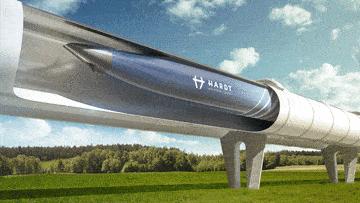The proposals to create a Hyperloop network continue, albeit slowly due to coronavirus. But time plays in favor of this means of transport of the future, sustainable and very fast.
Since yesterday, the results of the feasibility study on a route from Amsterdam to Paris have been discussed in the Netherlands. The paper establishes the economic feasibility of the route, which would connect the two European capitals in just 90 minutes.
Supposedly more sustainable than aviation and faster than today's high-speed trains, Hyperloop may be the future of domestic, international and even continental travel.
The report states that Hyperloop could carry 200.000 passengers per hour. Travelers could reach Paris from Amsterdam in less than half the time it currently takes by train and in about the same time as a direct flight.
Other routes
The study suggests that Brussels would also be less than an hour away from Amsterdam thanks to Hyperloop.
Hardt Hyperloop, the Dutch offshoot of the consortium, had already started a test facility in June 2019. Today, the results of this report mark the beginning of the next phase.
It looks like a victory on paper, but questions remain about the feasibility of Hyperloop.
Part of Hyperloop's appeal is its sci-fi credentials (the idea of sleek, aerodynamic pods whizzing around in a pressurized tube), but the concept is still in its infancy.
There are doubts that pods will be suitable for all ages and how easy it is to evacuate a pod in an emergency.
In addition, a lot of money needs to be invested in the startup phase, and government effort is also needed.
Other similar companies around the world continue their attempts to advance the technology, originally born from the owner of Tesla (and many other companies) Elon Musk. From the efforts of Hyperloop Italia led by our Gabriele Gresta to other world realities, everything moves towards the realization of this extraordinary medium.
In 2017, Virgin Hyperloop One built a life-size pod that reached a speed of 387 kilometers per hour on a test track in Nevada.
Dubai-based supply chain company Virgin Hyperloop One and DP World got the go-ahead from a state government in India in 2019 to develop a line between the cities of Mumbai and Pune.


